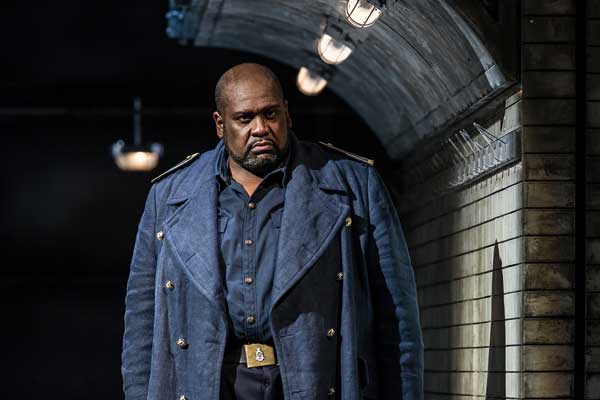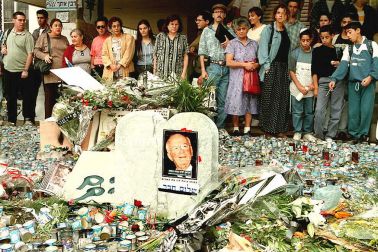There is only one test that a performance of Verdi’s Otello has to pass: do you come out of the theatre drained, desperate at the suffering that human beings who love one another can nonetheless inflict, so that they torture or even kill the object of their love? Shakespeare’s play is about other things besides, indeed that may not be the major test of a production of it. But Verdi and his librettist Boito took a straightforward view of what is Shakespeare’s longest and one of his most complex plays, so that what they give us is what Leavis called ‘the sentimentalist’s Othello’, in which, taking the Moor at his own valuation, we are asked to sympathise with a character who is so guileless that he believes anything that anyone tells him — unless it is his love object who tells him, in which case he thinks that she is trying to deceive him. The kind of love that Othello/Otello has for Desdemona, which is primarily narcissistic — explicitly so, if you look at the text of the love duet — means that anything that causes him to suffer in relation to it only shows how much he cares.
None of the Otellos that I have seen in recent years has brought this point home. Directors seem at a loss to deal with this work, because it is so straightforward that it doesn’t so much resist attempts to mess it around as simply bypass any ‘interpretation’ that might be foisted on it. Not that, so far as I could judge, Tim Albery, in the new production of the work by Opera North, which has just opened at the Grand Theatre in Leeds, wants to give any innovative account of it. He does set it in a US naval base in the second world war, but that hardly bears on anything that matters. Since Otello is played by a Trinidadian, issues of race might have been stressed, but they aren’t. In any case, Otello is more concerned about difference of age than race, though in this production he is, or looks, younger than Desdemona.
It gives the designer, Leslie Travers, the opportunity to have sets of uniform drabness, grey being the only colour except for a bit of Nature in Act II. There are plenty of staircases, little balconies, cupboard-like spaces ideal for overlistening, but no atmosphere. That is another contemporary shibboleth, to ensure that the audience has nothing agreeable to look at. While the men wear reasonably flattering uniforms, Desdemona and Emilia look as if they are in a Pinewood Studios movie of the non-escapist variety from the mid-1940s.
But before we get to the singers, the important thing is to celebrate the magnificence of the conducting, the orchestral playing, and for the most part the choral contributions. Richard Farnes, who conducted Otello more than a decade ago at Glyndebourne, with distinction, is, on home ground, inspired, and able, as he always is, to communicate his view of the piece to his orchestra. This account of Otello combines the precision of Toscanini with the expressiveness of Furtwängler, so from the whiplash opening the opera is propelled with manic intensity up to Otello’s great entry.
The drinking song, the exquisite mandolin chorus, the Act III finale get the grand treatment, though the chorus would have benefited from larger forces. But what is still more fascinating about Farnes’s conducting is his searching out of accompanimental figures which convey the obsessiveness that pervades the work, ostinati that nag underneath smoother textures, disconcertingly obtrusive odd notes from (in particular) the horns, though that may have been thanks to where I was sitting. Anyway, the result is that as an orchestral tour de force the opera grips throughout.
A good job, too, since the singing is on the whole undistinguished or worse. Ronald Samm, the Otello, alarmed with an underpowered ‘Esultate!’ which also suggested strain in his upper register. He is a fine presence, a painfully lumbering beast, and in certain passages he was moving, his great Act III monologue, for instance. He seemed much more at home singing the role in English three years ago with Birmingham Opera Company. David Kempster’s Iago is hard to make out. He has a pleasant, mellow voice, but he seems so eager to present the character as a brilliant deceiver that he never really reveals his hand, not even in his nihilistic Credo. Without hamming it up, he does need to snarl from time to time.
As for Elena Kelessidi’s Desdemona, one can only wonder what has happened to this singer who scored many successes at Covent Garden and other international centres, but who now seems hardly to have a singing voice. She wavers, she is guttural, unable to sustain long legato lines, and her voice has shrunk. One longed for Emilia, excellently sung and portrayed by Ann Taylor, to take over. The rest of the cast is adequate, but hardly strongly characterised. The net effect was frustrating, in a way that one has almost become reconciled to in performances of Wagner, but not of Verdi.






Comments